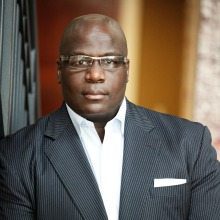
If anyone knows success as an entrepreneur, it’s Wayne Simmons. The co-founder and CEO of The Growth Strategy Company is also the co-author of GrowthThinking: Building the New Growth Enterprise. Prior to The Growth Strategy Company, Simmons founded and served as CEO of ICOR Partners LLC. He led the company to being recognized as one of Inc. Magazine’s ‘Inc. 500’s’ list of the fastest growing companies in the U.S., Consulting Magazine’s ‘Small Jewel’ award, as well as led the company to an acquisition in a private equity transaction.
Prior to ICOR Partners, Simmons also founded IO2Group Inc. and previously worked for Ernst & Young and Deloitte. He recently spoke with WashingtonExec, and revealed what inspired him to start The Growth Strategy Company, why he became an entrepreneur, advice for up and coming entrepreneurs, government involvement with small businesses and more.
WashingtonExec: What prompted you to co-found The Growth Strategy Company?
Wayne Simmons: After selling our last company, my partner and I decided to continue pursuing our passion for building and growing companies. To that end, we started The Growth Strategy Co. as our vehicle to bring the disciplines of entrepreneurship, growth strategy and innovation to large or mature companies as well as global corporations. We were fortunate to be able to pursue our passions and fill a void in the marketplace.
WashingtonExec: Earlier in your career, you worked for Ernst & Young and Deloitte before founding three businesses. Why become an entrepreneur?
Wayne Simmons: I learned a lot at both Ernst & Young and Deloitte. Those experiences taught me how business works and how to operate at the senior levels of some of the most well-known companies in the world. As a senior manager, I realized that making the next career step to a partnership came down to my expertise, ability to serve clients and my ability to independently generate business. When I took stock of my career and those three imperatives, it came down to a choice between using those skills to build a business within a larger firm, or build one for myself – it was an easy choice for me. It’s a bit ironic that the confidence that I gained from those early experiences were decisive in my having confidence to strike out on my own.
________________________________________________________________________________________________________
“The one advantage that entrepreneurs have over large companies is the ability to change direction quickly, so I recommend that they use that advantage liberally by continuously experimenting, challenging their assumptions and evolving their ideas, offerings and business models”
_________________________________________________________________________________________________________
WashingtonExec: What are some of the challenges entrepreneurs face?
Wayne Simmons: Entrepreneurs face the obvious technical challenges of gaining access to capital, talent and customers. But I think the real challenge relates to an entrepreneur’s level of belief in their idea or business. What I mean is, taking an idea and turning it into a business is really quite difficult and not for the faint of heart. If you don’t have the fundamental belief that your business will work, then I believe that it becomes virtually impossible to overcome the inevitable moments of doubt and the myriad of other challenges that entrepreneurs face.
WashingtonExec: What advice do you have for entrepreneurs?
Wayne Simmons: If I could pick one thing to tell entrepreneurs, it would tell them to be open to “pivoting.” The one advantage that entrepreneurs have over large companies is the ability to change direction quickly, so I recommend that they use that advantage liberally by continuously experimenting, challenging their assumptions and evolving their ideas, offerings and business models.
WashingtonExec: How does one start or grow a business and remain successful in these times of cuts to the federal budget?
Wayne Simmons: The cuts to the federal budget will separate those companies that provide, what are essentially, commodity services from those that have the ability to deliver what I call “radically increased value at radically reduced costs.” That idea sounds easier said than done, but think of the rise of drones in the aerospace/defense industry – these unmanned aerial vehicles provide 24/7 reconnaissance and strike capability at a much-reduced cost. That is a tangible example of this principle and how a company can grow despite a climate of budget cuts. With this idea, start-ups and established companies alike should think about whether they meet that standard. Otherwise, they will find themselves in an ultra competitive market where growth will be hard to come by.
WashingtonExec: What is your take on the growing trend of government really going out of their way to support small businesses versus large businesses?
Wayne Simmons: I think that the government’s approach to small business has honorable intent, but is fundamentally flawed. The current model is essentially promoting that small businesses become “smaller and weaker” versions of the large companies that they will inevitably have to compete with. Instead of promoting innovation and technological advancement that small businesses have historically excelled at, it basically promotes low barriers to entry and massive commoditization that ultimately hurts small businesses. I think that an innovation and value-driven small business development approach, such as the one used by Silicon Valley venture capitalists and applied by government entities like In-Q-Tel and Defense Advanced Research Projects Agency (DARPA), would lead to a more vibrant and sustainable small business community.
WashingtonExec: Does the current LPTA environment favor small businesses?
Wayne Simmons: I strongly believe that Lowest Price Technically Acceptable (LPTA) will be extremely corrosive to small businesses and the federal government over time. I say that because LPTA implies that everything should be considered a commodity that can be purchased for the lowest possible price. If government and small businesses stay in this “race to the bottom,” both parties will ultimately stifle the radical business and technological innovation that government desperately needs, and small businesses are so good at providing.
WashingtonExec: Can large contractors still be as innovative or entrepreneurial as smaller contractors?
Wayne Simmons: The long-term viability of large contractors depends on their ability to innovate and recapture their entrepreneurial spirit. However, many large companies don’t view themselves as entrepreneurs anymore. To overcome this we advocate what we call the “3Ms of corporate entrepreneurship.” That means that leadership must provide the mandate, promote the mindset and implement the models where the latent entrepreneurship resident in every company can take hold and thrive.
WashingtonExec: What book are you currently reading?
Wayne Simmons: I love history, so I am reading The Crimean War: A History by Orlando Figes.


